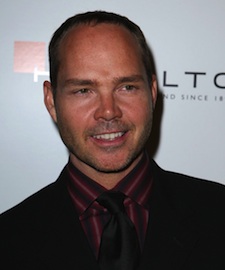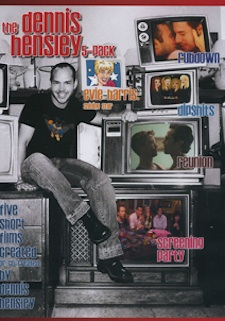DVD: Dennis Hensley Wants to Show You His Five-Pack
 Dozens of filmmakers are screening their work at the Sundance Film Festival, and a lucky few will leave Utah with a distribution deal. Those who don't could take a page from filmmaker Dennis Hensley, who collected together his various short films and is marketing them as The Dennis Hensley Five-Pack, a project he says was inspired by the "insulting" offers made by DVD companies who wanted to include his work in compilations of gay shorts.
Dozens of filmmakers are screening their work at the Sundance Film Festival, and a lucky few will leave Utah with a distribution deal. Those who don't could take a page from filmmaker Dennis Hensley, who collected together his various short films and is marketing them as The Dennis Hensley Five-Pack, a project he says was inspired by the "insulting" offers made by DVD companies who wanted to include his work in compilations of gay shorts.
Full disclosure: I've known Hensley for almost 20 years, and I've always been inspired by his singularly committed brand of self-promotion. If you've ever written a book that Oprah didn't talk about on her show, then you know it's entirely up to you to blow your own horn and pimp your own website. And Hensley knows how to get the word out about his projects, be they TV shows (he writes funny lines for Joan Rivers on E!'s Fashion Police), theatrical events (he hosts L.A.'s popular Mismatch Game), books, CDs, and now, movies on DVD.
The Five-Pack includes his festival faves Rubdown, Reunion, and Evie Harris: Shining Star -- the latter featuring actor Jack Plotnick as the boozy, washed-up starlet he would later play in the feature comedy Girls Will Be Girls -- as well as the animated short Dipshits and a pilot based on his book Screening Party. So, filmmakers, if the Weinsteins aren't calling you back, get out there and DIY it.
You've had a circuitous path to being a filmmaker -- you were a cruise-ship entertainer, a journalist (and Movieline interviewer), and a novelist, you've put out a CD as a singer-songwriter. Where did directing enter the picture?
The first thing I did was that I co-wrote and directed Evie Harris: Shining Star with Jack Plotnick; that was in 2001, and that's on the DVD. From there, I had always kind of wanted to do it, and had a longing to do it. I produced and wrote and appeared in a pilot for Screening Party, but I didn't direct it. And because that pilot got into Outfest, I was invited to enter the HBO short film contest -- if you had something you had written or directed in the festival, you were invited to submit a script and compete for a grant. So I submitted, and I was one of the three winners, and so I was given $15,000 to direct my short film from HBO. And that was kind of like the big break, where I said, "Oh, I get to be the director, to write and direct it." That was a great gift. And I kind of fell in love with it, and ended up directing another short the next year, because I was kind of on a roll and I wanted to keep doing it. It was something I always wanted to do, but getting that break from HBO really allowed me to step into the director's chair with a little bit of money behind me.
You had co-written the feature film Testosterone. Was that shoot a learning experience?
I was there for three weeks, out of five or six, and I got to observe the process a lot. It was really exciting -- we were in Argentina, and there were times when certain things would have to be changed in the script, just to suit a location and stuff, so I was there to help with some of that. But it was mostly just being down there and observing and getting to be in Buenos Aires. That was a really fun adventure, for sure.
 It's interesting that you're out there selling your films. I think a lot of short-film directors think they'll show it at some festivals, maybe put it on YouTube, but I don't know if filmmakers think there's a market for shorts. Do you get a feeling that there is?
It's interesting that you're out there selling your films. I think a lot of short-film directors think they'll show it at some festivals, maybe put it on YouTube, but I don't know if filmmakers think there's a market for shorts. Do you get a feeling that there is?
I'm not sure. I mean, I know I have some followers of my work, because I have a podcast and I've done some other work, so there are people friendly to my output. I don't know how many, but after a couple of the festivals, I got inquiries from some of these DVD companies that do gay compilations, and the money they were offering was so small that part of me was just like, "I'm gonna put this out there myself, and see if I can break even." In a way I was being defiant to these piddly numbers that were being offered, but you know, maybe that's their market and that's what they can afford to pay and that's what these things bring in. But it was almost insulting. I thought, If that's what we're talking, why would I tie up my rights for something that will barely buy me dinner?
So I just thought I'd do it myself, and I have five different projects that I could put on there. I had previously put out a CD of music in 2000, and CDBaby was a really artist-friendly online way to get your music out there. They took a cut, but not a big cut, and they offered a lot of resources. They're connected to this other company called FilmBaby, which I guess was a spinoff for independent filmmakers or people with video projects, so I thought I'd do it that way. So I put it together -- and I don't know if I've sold any yet, they just went up. I know I've sold one. [Laughs] I could take a huge bath on it, but they weren't that expensive to produce, and at least this way it's my own thing instead of giving up my rights to a company and getting a little bit of money.
You're a tireless self-marketer. For filmmakers who are selling their own stuff for the first time, give me a little background on how you've managed to build your online presence over the years.
Well, I've tried to keep a database of people that have liked my work or sent me e-mails about my books and stuff like that. I haven't always done great at that, but I did know early on: OK, keep track of these people, because next time you have a project, you want to reach out to them. Or if you're gonna do a book tour, and they're in Chicago, you know. I did have an eye on that. In the last six months, I started an online newsletter once a month through a company called Constant Contact that helps you manage that stuff better, where you can have a mailing list instead of me just writing down e-mail addresses. I would just tell people to keep track of people who respond to what you do, and try to keep in touch with them every once in a while, when you have something going on, without overloading them. With this DVD, I didn't have my eye on huge profits; I just figured it wasn't that much to risk if nobody bought it. And I wanted to have it to give to people anyway as a demo, so why not try to sell a few online?
Over the years, fans of Girls Will Be Girls have always wanted to see that Evie Harris short, which was sort of a precursor to that, but I never had a good copy on DVD, and it was on YouTube but it was grainy, so I think there's a handful of Evie junkies that would want it to watch when they want to.
In this age of Facebook, do you think it's still important to have a personal website?
The personal one helps brand you, I think, because you can give it your own look and all of that stuff. Facebook is very uniform for everybody, so I think it's good to have a personal site, because you can have longer clips there, and I'm sure it can do things that Facebook doesn't do, although Facebook does a lot of it now.
So these days you're writing for TV; do you see yourself directing a feature at some point?
[Laughs] My goal is to make a feature by the time I'm 50, but I'm the holdup -- I don't have a script. I need to write a script, and then I'm sure it will be a nightmare to get people to care or whatever, but I can't ... I'm the obstacle right now. I've started writing an adaptation of my book Misadventures in the (213) -- now, I think, it could be a '90s nostalgia piece. So that's what I'm trying to work on; I'd love to direct a movie.
A friend of mine did some directing of promotional stuff for different studios, and there were always all these cooks in the kitchen, and he asked me, "Why do you like to direct?" because he didn't, it was really stressful to him. For me, it was like falling in love. After the last short film I made -- it was only a two-day shoot -- I woke up the next morning feeling like I had been hit by a truck and I felt like I was also in love. I couldn't have physically done another day, I felt like I was so beat up, but I guess there's something about using so much of your mind and collaborating with different people and answering so many questions. I just loved the challenge of it.
I love writing books and things like that, but that's very solitary, and I love the things that happen that you had nothing to do with but you're there for it and you get to guide it and shape it. I love the process of it, and each element that comes on top of that, the editing and the music and stuff. Using all those things to heighten what it is you're going for, and knowing that any one of those things could send it all off the rails. And also the way movies work on people or don't work on people is such a mystery. It's amazing to see great work, but then you see one that doesn't work, and you're like, "But you're Martin Scorsese! What happened?" It's a medium I've always loved as a viewer, so it's fun to try it and see what comes out.
